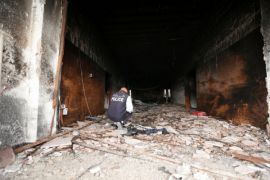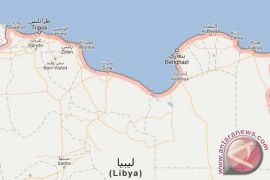"UNHCR emergency teams are working with Tunisian and Egyptian authorities and NGOs (non governmental organisations) to support close to 100,000 people that have fled the violence in Libya in the past week," the office of the UN High Commissioner for Refugees said in a statement.
A UNHCR count showed that they were overwhelmingly foreign migrants, mainly Egyptians and Tunisians.
However, the total also included 4,600 Libyans who fled to Egypt and Tunisia.
The Red Crescent said earlier that more than 10,000 people fled Libya into Tunisia at the Ras Jedir post on Saturday alone, calling the situation a "humanitarian crisis" as the flow grew.
Before those arrivals, the Tunisian government said Saturday that 40,000 people had crossed from Libya since February 20, while Egyptian authorities accounted for 55,000 people fleeing since February 19, according to the UNHCR.
"We are committed to assisting Tunisia and Egypt in helping each and every person fleeing Libya," the High Commissioner for Refugees, Antonio Guterres, said.
"We call upon the international community to respond quickly and generously to enable these governments to cope with this humanitarian emergency," he added.
More than 100 tonnes of aid supplies for 10,000 people, including tents, blankets and shelter equipment, was flown into Tunisia on Saturday for use on the Libyan border, the agency said.
The UNHCR revealed that its staff had made an unplanned crossing from Egypt, and met Libyan police and military nearby who said that they had defected from government forces and were working with local committees of tribal leaders.
Those tribal leaders told the agency there was a need for humanitarian assistance in Libya, "with a critical shortage of food throughout the eastern region, as well as shortages of some medical supplies," it added.
However, International Committee of the Red Cross staff who arrived in the northeastern city of Benghazi, Libya`s second largest, reported that food was available there.
"Our initial assessment is that there is no urgent need for food supplies. It`s difficult to know, however, what the needs are outside the city," he added," said Simon Brooks, the ICRC`s team leader.
The UN`s World Food Programme warned on Friday that Libya`s food supply chain was "at risk of collapsing" in the import-dependent country after ships stopped docking and distribution was reportedly hampered by the violence.
Fears were growing for about 11,000 African or Middle Eastern asylum seekers and refugees bound for Europe who were registered by the UNHCR in Libya before the crisis, mainly in the capital Tripoli which is still held by Libyan strongman Moamer Kadhafi.
"We`re getting desperate calls from refugees in Libya, the most vulnerable are in Tripoli," UNHCR spokeswoman Melissa Fleming told AFP.
"It`s a death sentence if they go out on the streets," she added.
UNHCR staff also found 75 people from Bangladesh, Sudan, Thailand and Pakistan without passports in a patch of no-man`s land between Libya and Egypt who were given shelter equipment, blankets and food.
Fleming said that UNHCR staff did not press deeper into Libyan territory.
No crossing was attempted from Tunisia into western Libya, she said.
The International Organisation for Migration (IOM) said on Saturday that it had also found about 1,000 people from Niger had fled to their neighbouring homeland after being released from an asylum detention camp in Libya.
(*)
Editor: AA Ariwibowo
Copyright © ANTARA 2011



